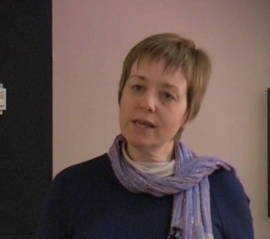

I would like to start off by thanking Santi and Geoffrey very much for the opportunity to say a few words about the research that they have been doing. I was lucky enough to have a sneak preview of the report about their work last week. So I thought I will just share with you very briefly some thoughts and reflections as a result of reading it.
First of all, I really enjoyed reading some of the extracts of interviews and focus group discussions with young Bangladeshis who took part in the research. It seemed evident to me a lot of them were speaking a great deal of sincerity and a very high degree of genuine self interrogation that I find really inspiring and humbling. But I am also struck by how the issues that these young people were facing around intergenerational tensions, personal security, marital happiness are in fact common to us all, many of us and in many ways, and regardless of our faith backgrounds, or our different world views, to some extent we are all concerned about achieving some kind of resolution of these issues in our own lives. But I really enjoyed a great deal and learnt a lot about the way that young Bangladeshis are managing these issues either in the UK or in Bangladesh itself, and using Islamic resources and principles as their guide.
Following on from this, the second thing that I found myself reflecting on is the very positive challenge that this reality poses for wider British society. The general assumption that we live in a so-called secular society is called into question in a profound and important way as a result of the project's findings. As the Muslim sociologist Tariq Modood has said, the presence of Muslims in Britain has changed the character of religion in Britain as a whole and has given it "an importance [that is] out of step with native trends" (Times Higher, 3 Sept. 2004). And what Santi and Geoffrey's report highlights so helpfully is the empirical reality behind that observation.
As you will no doubt be aware there have been very contested debates in academic circles, but also in Muslim communities around the world about what constitutes religious authenticity or 'true Islam'. And these debates are very often quite abstract, quite theological, quite textual, quite theoretical. It's another thing that I found helpful and interesting as a result of reading the report is actually how these issues are negotiated on a day to day basis in real life. And the work that Santi and Geoffrey has done provide us with a glimpse as to what it actually mean for real people. And so I think their work helps to close the gap between empirical reality and theoretical debate.
I also spent a little bit of time reflecting on the significance of their research findings within the overall field of British Muslim studies as it has evolved over the last 30 or 40 years. In the1970s and 1980s, very important research was conducted which charted the migration history and settlement of particular ethnic groups who happened to be Muslim in many British towns and cities. But it seems to me that over the last decade or so research about Islam in Britain has tended to move away from a concern with particular ethnic groups. And so the analytical lens has tended to be perhaps on youth or women or those who are of particular towns or cities or those who belong to particular school of thought.
Important though this research has been the experiences of distinctive ethnic groups has become marginalized. And yet from what we know about the migration and settlement of Muslims in Britain there are very important differences between Muslims who have arrived here from different countries of origin, or at different points in time. And so Santi and Geoffrey's work points to the value of researching some aspects of British Muslim experience through the distinctive lens of ethnicity and their work enables very meaningful connections with a body of research and writing that conducted about Bangladeshis arriving in Britain in the 1960s, 1970s and 1980s.
It is inevitable that all empirical research is a snapshot in time. But Santi and Geoffrey's work provides a particularly clear and interesting picture of what was happening for a distinctive group of young Bangladeshis living both here in the UK and in Bangladesh in the late 2000s. But I am already thinking to myself about how things might unfold for them in future. And I find myself reflecting on some of the comments made by the young people interviewed for the research and questioning to what extent their confident hopes for security and happiness will be realized. How will Islamic resources enable them to face the challenges of building not only happy marriages but also stable and secure families? I think that like all good research, the findings from this particular study point to an important future research agenda which might examine the stability and longevity of so-called Islamic marriages and particularly the experiences of children brought up within these unions.
In summary then, I thought that what Santi and Geoffrey has done makes a very important contribution to the study of Islam and Muslim communities here and in Bangladesh and I am really looking forward to reading some of findings that are going to come out of the project into the future. Thank you very much both of you for adding to the scholarly debate.